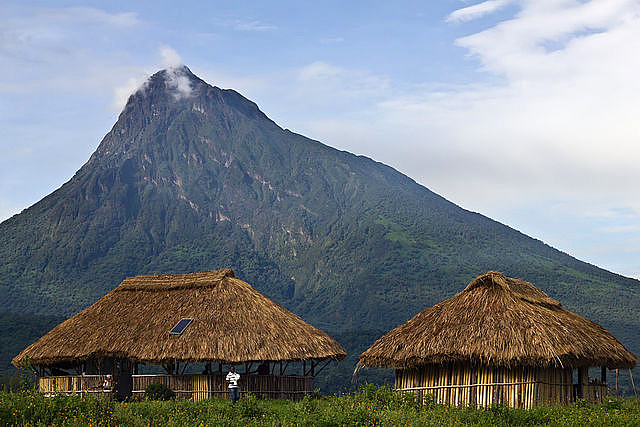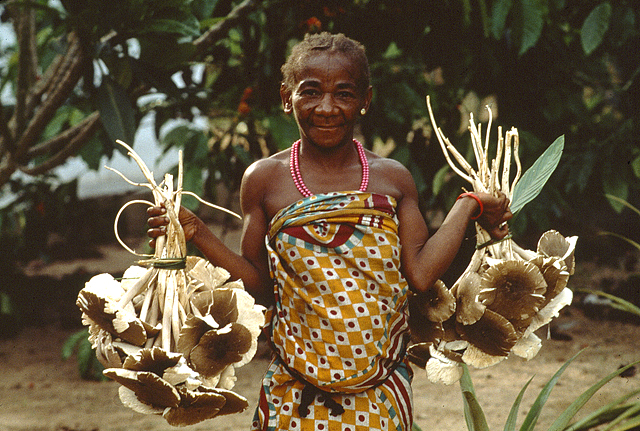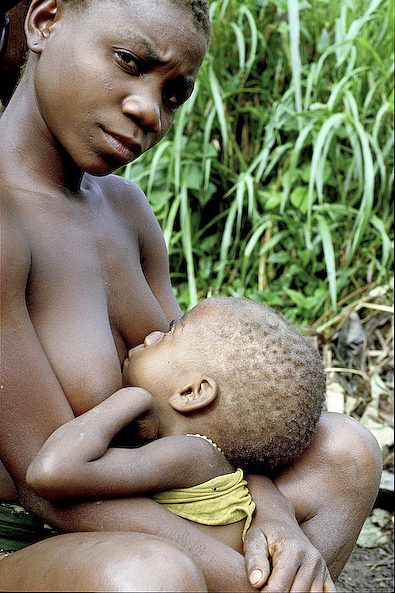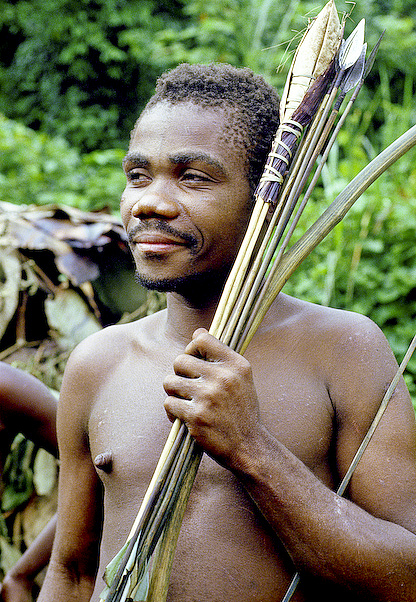When the Mbuti trespass in the forests of the world famous Virunga National Park to forage or to hunt, park guards frequently treat them brutally. The Inter Press Service reported recently on the harsh treatment and the discrimination that the indigenous people of the northeastern D.R. Congo receive from the national park service. The Mbuti fear that they will lose their traditional hunting and gathering skills if they can’t continue to use the forest resources.

The IPS covered the story in two parts, one on September 14 and the second on September 15. The focus of the description is the Virunga National Park, which stretches north from Goma, the capital of North Kivu Province, in a patchwork of lands for about 300 kilometers. It includes the Virunga Volcanoes, the mountainous habitat of many mountain gorillas, and, farther north, the Ruwenzori Mountains. The IPS journalist interviewed Congolese park officials and Mbuti living in the small hamlet of Mudja, located at the south end of the park about 20 kilometers north of Goma.
The Virunga National Park, the oldest in Africa, was created in 1925 as Albert National Park by Belgian King Albert and it has had a policy of excluding Africans right from the beginning. With over 7,000 square km. to protect from poaching, the park agency has become more determined and forceful in the past few years in excluding all people other than tourists. The park is managed cooperatively by the Congo’s National Park Authority (the ICCN) and a group called the Virunga Foundation, funded by the EU. About a quarter of the world’s mountain gorillas live in the park—and serve as magnets for many international tourists.

A man in Mudja showed the journalist an injury he got on his arm from a park guard. Another man, Giovanni Sisiri, chimed in with his account: “Just the day before yesterday, they shot at me when I was looking for honey and firewood. I abandoned everything, took my tools, and ran.” The fact that the Mbuti were the original inhabitants of the forests around the volcanoes and mountains is irrelevant. They have continued to defy Congolese law by going into the park to collect wood, gather non-timber forest products, and hunt small animals for food. However, those activities have become more dangerous in the past couple years.
In contrast to a news report only a few weeks ago about the cooperative spirit that is developing between park managers at the Itombwe Mountains several hundred miles south of Goma and the Mbuti living around that newest protected area, a spirit of active conflict has developed in the Virunga region. Patrick Kipalu, the manager for the DRC of the Forest People’s Program, attributed the hostility to the approach promoted by the Belgians during the colonial period—remove all the people from the forests in order to protect the plants and animals. The Belgians trained the Congolese, who have continued to manage using those same strategies, he argued.
Norbert Mushenzi, the deputy director of the park, defended his employees from charges of repressive behavior toward the local people. His rangers are “undertaking legitimate defense,” he said. He maintained that the park is trying to help the Mbuti find alternatives to going into the forest—such as farming in the surrounding fields. “The problem is not land. It’s that people want to concentrate in the park and we don’t know why,” he said.

Mr. Mushenzi, however, had little good to say about the Mbuti themselves. They have an “intellectual deficiency,” he argued, and one way for them to get along more effectively with the park authorities would be for them to “sell their cultural products and dances to tourists.” The IPS journalist pointed out that Mr. Mushenzi’s arrogant attitude is shared by many of the Bantu Congolese, who accept the notion that the Mbuti, with their persistent preference for living in forests, are decidedly inferior human beings. If only they would settle into an agricultural lifestyle they would be more acceptable, many Congolese seem to believe.
But Mr. Kipalu, the official with the Forest People’s Program, believes that the living conditions of the Mbuti are much worse now than they were when they were living in the forest. “Being landless and living on the lands of other people means that they end up being treated almost as slaves,” he told the IPS.
Doufina Tabu, the president of the Association of Volunteers of Congo (ASVOCO), a group that tries to help the Mbuti, agrees and disagrees with Mr. Kipalu. Mr. Tabu told the reporter of an Mbuti man who was arrested because he persisted in trying to use his field, which he was tricked out of. He was accused of illegally occupying his land, for which he did not have a title even though it is his own property. “He was arrested one year ago and we are still trying to get him out,” Mr. Tabu said.

Mr. Sisiri, the Mbuti man from Mudja who was attacked by the park rangers, reacted to the whole discussion by taking out his bow and arrow and pointing at the nearby forest. “We will have to start a rebellion one day!” he said, and he laughed. “We first want peace. But if the provincial and central governments do not find a solution for us, we will have to fight for it.”
His comments reflect the traditional peacefulness of the Mbuti, but nonetheless the indigenous people living around the Virunga National Park are being repressed as never before. Mr. Tabu may advocate for Mbuti rights but in his opinion the only solution for them is integrating with the larger society. “There are things in their culture that we must change. They can’t continue to stay in the forest like animals,” he said. Mr. Kipalu expressed a longer term, wait and see, attitude.